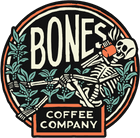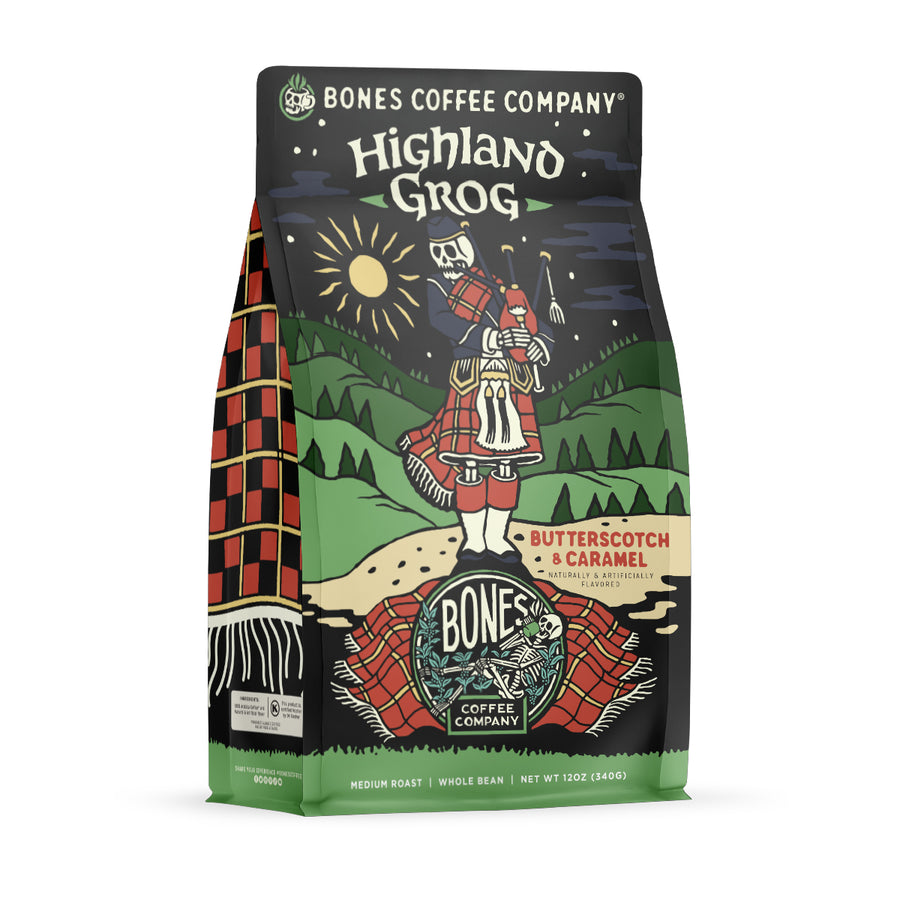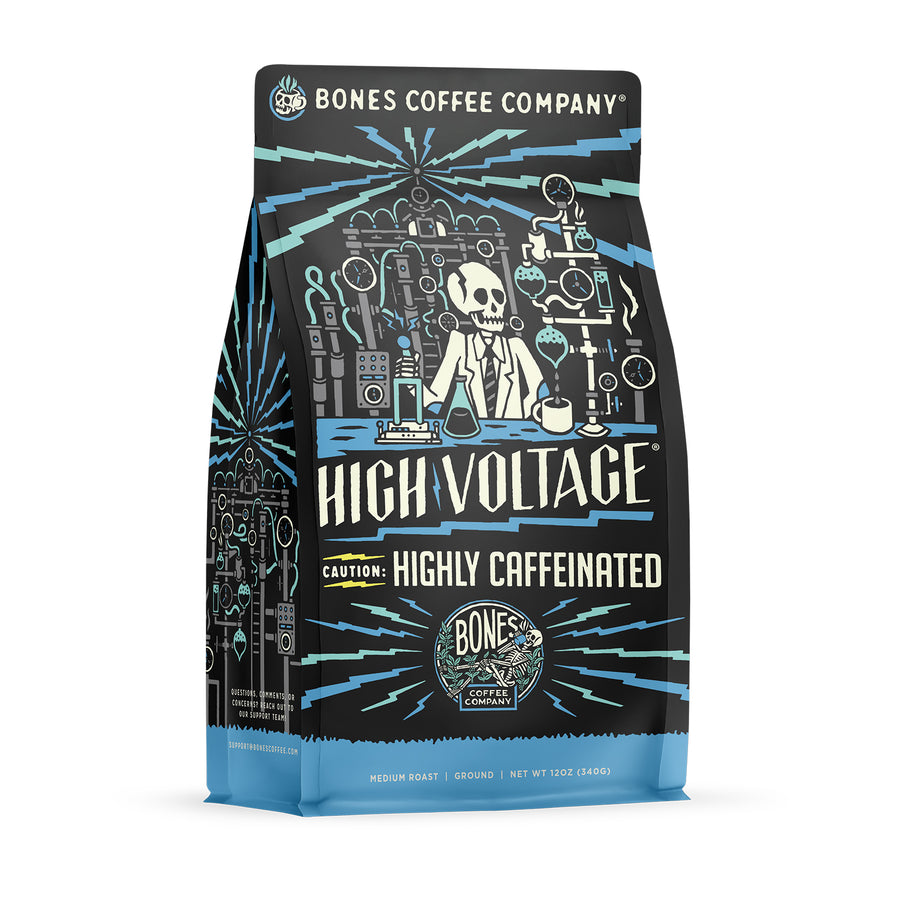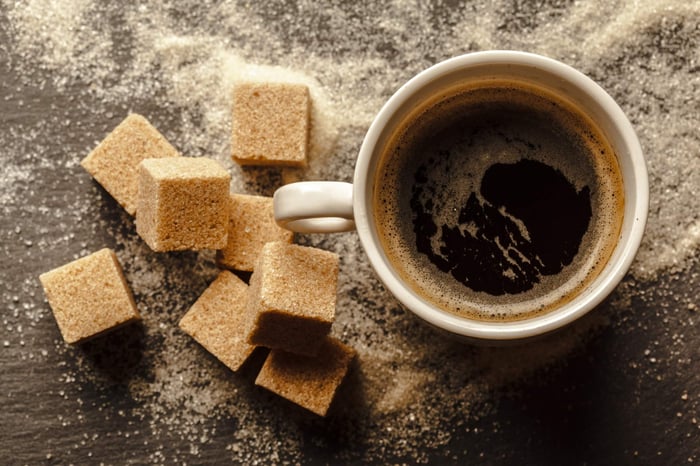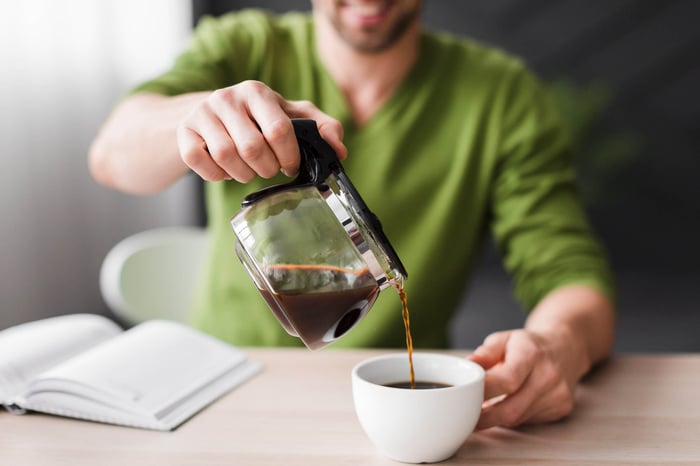You’ve had your first sip, but the caffeine rush you’re counting on doesn’t hit right away. That’s because caffeine absorption follows a timeline, and understanding how it works can help you time your coffee more effectively.
From your digestive system to your brain, here's a breakdown of how long it takes for caffeine to kick in—and how long your morning brew will keep you sharp.
The Science of Caffeine Consumption
When you take that first glorious sip of coffee, caffeine absorption kicks off a series of reactions in your body, but the effects aren’t instant.
How the body processes caffeine depends on several factors, including metabolism, body weight, and overall tolerance, which is why some people feel it sooner than others.
After entering the stomach and small intestine, caffeine affects the body by quickly making its way into the bloodstream. From there, it travels to the brain, where it blocks adenosine receptors—the neurotransmitters responsible for promoting sleepiness.
This action reduces fatigue and provides that familiar energy boost and heightened focus that so many of us count on to jumpstart our day.
Understanding how your body processes caffeine can help you time your intake to align with when you need that mental edge most.
Fun Fact: Caffeine has a half-life of about 4 to 5 hours, meaning a 95 mg cup of coffee at 8 AM leaves around 47.5 mg by 1 PM and 25–30 mg by 4 PM. Its breakdown is exponential, so the effects of caffeine can last much longer than you might think. |
What Happens After You Drink Coffee

The journey from your first sip to peak alertness follows a well-studied timeline. Understanding how caffeine works and what happens after consuming caffeine can help you time your intake for better focus, improved energy, and fewer crashes.
Immediate Effects (0-15 Minutes)
Within the first few minutes of consuming caffeine, you may begin to notice subtle changes, even before the caffeine fully takes effect.
While caffeine acts more gradually in the body, the warmth of the drink, the familiar ritual, and the mental association with increased energy can trigger a quick psychological response.
Some people report feeling more alert or ready for physical activity almost immediately, though this initial “boost” is largely a placebo effect.
Early Absorption (15-45 Minutes)
This is when caffeine works its way into full effect. During this window, the amount of caffeine in your bloodstream begins to rise sharply, triggering noticeable physiological changes.
You may experience a slight rise in heart rate and blood pressure, along with an energy boost and improved mental clarity.
The effects of caffeine start becoming more apparent—you begin to increase alertness, focus, and concentration, making this a prime time for engaging in mentally demanding tasks or gearing up for physical activity.
Peak Performance (45-90 Minutes)
 | Hit your peak with Bones Coffee's Espresso! A full-bodied, low-acid roast with smooth notes of cocoa and citrus. Available in espresso grind or whole bean, roasted fresh to order for maximum flavor! |
Here’s where the caffeine kick reaches its full effect. Around 45 to 90 minutes after intake, caffeine concentration in your bloodstream peaks, and the effects of caffeine are at their strongest.
As a central nervous system stimulant, caffeine enhances cognitive function, leading to increased alertness, sharpened focus, and improved mental performance.
Regardless of how much caffeine you consume, this window is typically when you'll feel its most energizing and productive effects.
This is also where the “90-minute rule” comes into play—holding off on additional caffeine during this time helps avoid overstimulation and ensures a more balanced energy curve.
The Sustained Phase (2-6 Hours)
After caffeine levels peak, they begin to decline gradually, but that doesn't mean the effects wear off right away. This is the window where most people still feel energized and alert, as caffeine continues to kick just enough to support focus and concentration.
A standard cup containing about 80–100 mg of caffeine typically sustains energy levels for 4 to 6 hours. However, factors like personal tolerance, metabolism, and how much caffeine you’ve consumed throughout the day can significantly impact duration.
To avoid caffeine-induced jitters or disrupted sleep later on, it’s smart to avoid consuming caffeine too late in the afternoon. For most people, having too much caffeine past 2 PM can interfere with rest and lead to a late-day energy crash.
Factors That Influence Caffeine's Effectivity
Not everyone experiences their cup of coffee the same way. Several factors can influence how fast caffeine kicks in, how long it lasts, and how strongly it's felt. The same cup of coffee might give one person a smooth energy boost and another a short-lived jolt.
Genetic Variations
Your genetic makeup plays a significant role in caffeine metabolism. People with certain genetic variants of the CYP1A2 enzyme metabolize caffeine much faster than others.
Fast metabolizers might feel effects sooner but also experience shorter duration, while slow metabolizers take longer to feel the effects but enjoy extended alertness.
Larger individuals typically require more caffeine to achieve the same effects as smaller people. Body weight, muscle mass, and overall composition all influence how quickly caffeine disperses through your system and reaches effective concentrations.
Food Consumption
How quickly caffeine kicks in often depends on whether you’ve eaten beforehand. Drinking coffee on an empty stomach typically leads to faster absorption, with effects many coffee drinkers experience first thing in the morning.
On the other hand, having your cup of coffee with food, especially a high-fat meal or a snack like dark chocolate, can delay caffeine absorption by 30–60 minutes.
While the onset is slower, it can lead to a more balanced and longer-lasting energy release without a sudden spike or crash.
Tolerance and Regular Consumption
If you drink coffee daily, your body may build a tolerance to caffeine, meaning it takes more to feel the same effects.
While a single cup of coffee might give a noticeable boost to someone who rarely consumes caffeine, regular drinkers often need 2–3 cups or even turn to energy drinks for a similar effect.
Over time, as your body adapts, caffeine takes longer to produce noticeable benefits—and may feel less intense. Additionally, if you're sensitive to caffeine, consuming more than your usual amount can make you feel jittery, even if your tolerance is fairly high.
How Long Will One Cup Keep You Awake?
A single cup of coffee typically provides 4-6 hours of noticeable alertness, but the exact duration depends on several factors. Understanding these variables helps you plan your coffee consumption throughout the day.
Average Duration by Consumption Patterns
| Consumer Type | Duration of Effects | Recommended Timing |
| Occasional drinker | 6–8 hours | Morning only |
| Regular drinker (1–2 cups/day) | 4–6 hours | Morning and early afternoon |
| Heavy consumer (3+ cups/day) | 2–4 hours | Last cup 6–8 hours before bedtime |
The intensity of effects also varies throughout this duration. You'll experience peak alertness during the first 2-3 hours, followed by a gradual decline.
However, even during the decline phase, caffeine continues to provide subtle stimulation that can interfere with sleep if consumed too late in the day.
Cold brew coffee, depending on its strength, can contain more caffeine than a typical brewed cup, which may extend its stimulating effects. If you're drinking cold brew later in the day, be mindful—it can keep you alert even longer than expected.
Fun Fact: Caffeine doesn't actually provide energy—it prevents you from feeling tired! It works by blocking adenosine receptors in your brain, essentially masking fatigue rather than eliminating it. This is why you might experience a "crash" when caffeine wears off. |
When Coffee Makes You Feel Sleepy
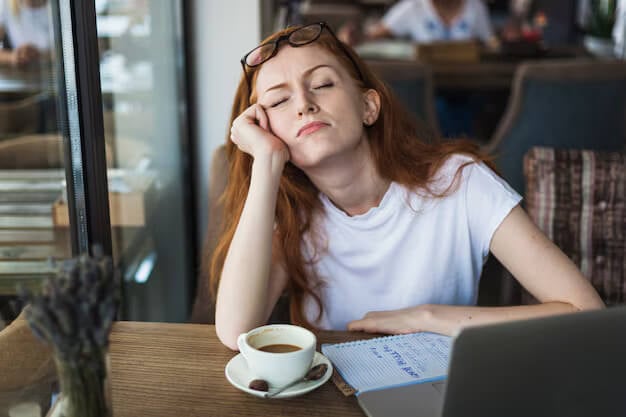
Surprisingly, some people feel sleepy after drinking coffee—a phenomenon that seems to contradict caffeine's stimulating properties. This counterintuitive reaction has several scientific explanations.
Adenosine Rebound
When caffeine blocks adenosine receptors, it temporarily delays feelings of tiredness. However, your brain doesn’t stop producing adenosine while you're caffeinated.
Once the caffeine wears off, the built-up adenosine rushes in all at once, which can trigger an even stronger wave of fatigue than you felt before your coffee.
This adenosine rebound is one reason you might feel more tired a few hours after your drink, regardless of how long it takes for the caffeine to kick in.
Blood Sugar Fluctuations
Coffee can trigger blood sugar spikes—especially when consumed with sweeteners or on an empty stomach—followed by sudden crashes.
These blood sugar swings may interfere with your energy levels and make it harder for caffeine to kick in effectively.
In some cases, instead of feeling alert, you may experience fatigue or even feel like you could fall asleep shortly after finishing your cup. Balancing your coffee intake with a protein-rich snack can help stabilize blood sugar and promote more stable energy.
Dehydration Effects
Caffeine has mild diuretic properties, which can lead to fluid loss if you're not staying properly hydrated. For heavier coffee drinkers, this can result in fatigue or sluggishness, making it feel like caffeine didn’t kick in at all.
In fact, dehydration caused by insufficient water intake alongside your increased coffee intake may actually make you feel more tired or even ready to fall asleep, despite the caffeine content.
To avoid this, always pair your coffee drink with enough water to stay balanced and energized.
Pro Tip: If coffee makes you sleepy, try drinking it with a protein-rich snack to stabilize blood sugar, ensure you're well-hydrated, and consider reducing your caffeine intake to avoid tolerance buildup. |
Making the Most of Your Coffee Experience
Knowing how and when to drink coffee can help you optimize focus, maintain steady energy, and protect your sleep. Since everyone responds to caffeine differently, it’s worth paying attention to how your body reacts—and adjusting your routine accordingly.
Whether you're chasing that perfect caffeine kick or just want to enjoy coffee without the crash, your brew should work for you.
With over 30 bold, small-batch flavors (and decaf, too!), Bones Coffee Company helps you turn your daily coffee habit into a flavorful, low-carb experience—with no shortcuts on taste.
Ready to brew smarter and better? Explore our collection and discover how great timing meets great flavor in every cup.
